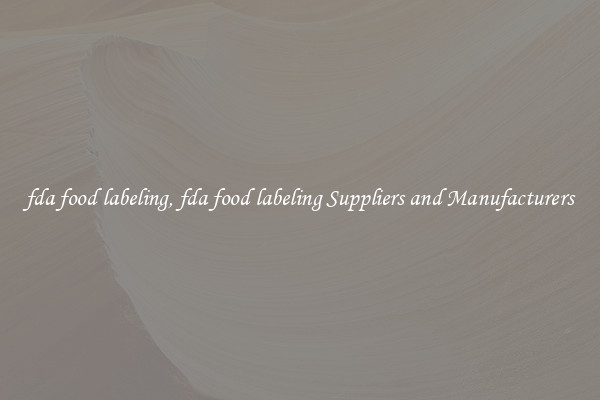fda food labeling, fda food labeling Suppliers and Manufacturers
FDA Food Labeling: Ensuring Consumer Safety and Transparency

Food labeling is an essential aspect of the food industry that not only provides valuable information to consumers but also ensures their safety. The Food and Drug Administration (FDA), a regulatory agency in the United States, plays a crucial role in regulating and enforcing food labeling standards. In this article, we will explore the significance of FDA food labeling, as well as the important role of FDA food labeling suppliers and manufacturers.
FDA food labeling serves as a critical tool for consumers, enabling them to make informed choices about the food they eat. It provides information about the nutritional content, ingredients, allergens, and potential health risks associated with a particular product. By providing comprehensive and accurate labeling, the FDA helps individuals manage their dietary needs, allergies, and health conditions, such as diabetes or high blood pressure.
Moreover, food labels play a vital role in promoting transparency and trust between consumers and food manufacturers. FDA regulations require manufacturers to specify the precise ingredients used in their products, including any artificial additives or preservatives. This transparency allows consumers to make ethical and environmentally conscious choices, promoting sustainability and supporting companies that align with their values.
FDA food labeling requirements also enforce the inclusion of specific safety warnings and instructions on labels. For example, manufacturers must highlight potential allergens, such as peanuts or gluten, to protect individuals with allergies from consuming these substances unknowingly. The FDA also regulates labeling regarding the appropriate storage conditions, expiration dates, and cooking instructions, ensuring that consumers handle and consume their food safely.
To comply with FDA regulations and create accurate food labels, suppliers and manufacturers rely on reputable and qualified labeling suppliers. These suppliers offer a range of services to assist in the labeling process, including design, printing, and materials sourcing. They ensure that labels meet all regulatory requirements while maintaining an appealing and informative design.
Labeling suppliers work closely with manufacturers to ensure that all necessary information is included on the label. They carefully consider factors such as font size, readability, and label placement to enhance consumer accessibility and comprehension. Additionally, labeling suppliers stay up-to-date with FDA guidelines, ensuring that the labels provided to manufacturers remain compliant with any changes in regulations.
Manufacturers must collaborate with labeling suppliers to guarantee that their food products meet FDA labeling standards. By partnering with qualified suppliers, manufacturers can ensure that their products are properly labeled, reducing the risk of recalls or penalties due to non-compliance. Partnering with reliable labeling suppliers helps manufacturers maintain their reputation for product safety and consumer trust.
In conclusion, FDA food labeling serves as a crucial method to ensure consumer safety and transparency in the food industry. By providing valuable information about nutritional content, potential allergens, and proper handling, food labels empower individuals to make informed decisions about their dietary choices. Suppliers and manufacturers play a pivotal role in this process by working together to create accurate, compliant labels that meet FDA regulatory standards. Through this collaboration, consumer safety and confidence in the food industry are upheld, fostering a healthier and more informed population.

View details

View details

View details

View details








